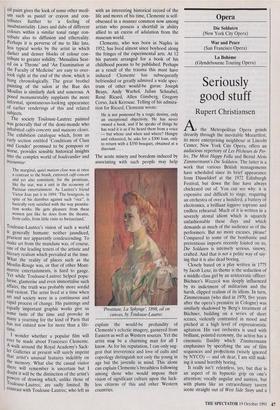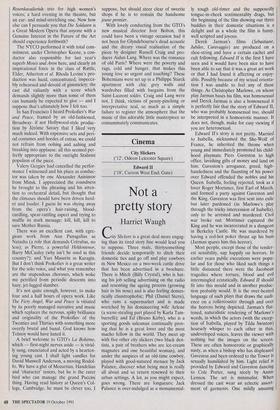Opera
Die Soldaten (New York City Opera) War and Peace (San Francisco Opera) La Boheme (Glyndebourne Touring Opera)
Seriously good stuff
Rupert Christiansen
Athe Metropolitan Opera grinds drearily through the inevitable Mozartfest, its more enterprising neighbour at Lincoln Center, New York City Opera, offers an audacious repertory of Les Pecheurs de Per- les, The Most Happy Fella and Bernd Alois Zimmermann's Die Soldaten. The latter is a work that various British managements have scheduled since its brief appearance from Dusseldorf at the 1972 Edinburgh Festival, but down the line have always chickened out of. You can see why: it is expensive and difficult to stage, requiring an orchestra of over a hundred, a battery of electronics, a brilliant leggiero soprano and endless rehearsal. Much of it is written in a severely atonal idiom which is squarely unfashionable these days and which demands as much of the audience as of the performers. But no more excuses, please! Compared to some of the bombastic and pretentious imports recently foisted on us, Die Soldaten is intensely serious, sinewy, crafted. And that is not a polite way of say- ing that it is also dead boring.
Closely based on a play written in 1775 by Jacob Lenz, its theme is the seduction of a middle-class girl by an aristocratic officer: Btichner's Wozzeck was deeply influenced by its indictment of militarism and the harsh, clipped realism of its idiom. In turn, Zimmermann (who died in 1970, five years after the opera's premiere in Cologne) was similarly shadowed by Berg's treatment of Buchner, building on a series of short scenes, violently contrasted in mood and pitched at a high level of expressionistic agitation. His vast orchestra is used with brilliant, pointed economy, the action has a cinematic fluidity which Zimmermann emphasises by specifying the use of film sequences and projections (wisely ignored by NYCO) — and oh dear, I am still mak- ing it sound horribly boring.
It really isn't: relentless, yes, but that is an aspect of its hypnotic grip on one's attention; vocally angular and austere, but with plums like an extraordinary tavern scene straight out of West Side Story and a Rosenkavalierish trio for high women's voices; a hard evening in the theatre, but an ear- and mind-stretching one. Now how else can I persuade you that Die Soldaten is a Great Modern Opera that anyone with a Genuine Interest in the Future of the Art should experience forthwith?
The NYCO performed it with total com- mitment, under Christopher Keene, a con- ductor also responsible for last year's superb Moses und Aron here, and clearly an inspirational force in the class of Rattle, Elder, Atherton et al. Rhoda Levine's pro- duction was lucid, concentrated, impecca- bly rehearsed and devoid of gimmickry; the cast did valiantly with a score which demands slightly more than some of them can humanly be expected to give — and I suppose that's ultimately how I felt too.
In San Francisco I heard Prokofiev's War and Peace, framed by an old-fashioned, Broadway- if not Hollywood-style produc- tion by Jerome Savary that I liked very much indeed. With expensive sets and peri- od costumes and hordes of extras, we could not refrain from oohing and aahing and breaking into applause: all this seemed per- fectly appropriate to the outright Stalinist populism of the piece.
Valery Gergiev had cancelled the perfor- mance I witnessed and his place as conduc- tor was taken by one Alexander Anisimov from Minsk. I appreciated the roundness he brought to the phrasing and his atten- tion to orchestral detail, but thought that the climaxes should have been driven hard- er and louder. I guess he was shying away from the opera's hair-raising, blood- curdling, spear-rattling aspect and trying to muffle its stark message: kill, kill, kill to save Mother Russia.
There was an excellent cast, with egre- gious work from Ann Panagulias as Natasha (a role that demands Cotrubas, no less); as Pierre, a powerful Heldentenor, Barry McCauley (why isn't he used in this country?); and Yuri Masurin as Kuragin. But I don't think Prokofiev is a great writer for the solo voice, and what you remember are the stupendous choruses, which woke me petrified from periodic descents into hazy, jet-lagged slumber.
It's not quite enough, however, to make four and a half hours of opera work. Like The Fiery Angel, War and Peace is vitiated by its poorly managed narrative and music which replaces the nervous, spiky brilliance and originality of the Prokofiev of the Twenties and Thirties with something more overtly brutal and banal. God knows how Tolstoy would have hated it.
A brief welcome to GTO's La Boheme, which — first-night nerves aside — is vivid- ly sung, ennnciated and acted by a hearten- ing young cast. I shall light candles for David Maxwell Anderson, a moving Rodol- fo. We have a glut of Mozartian, Handelian and 'character' tenors, but he is the rarer bird who can manage the grand Puccini thing. Having read history at Queen's Col- lege, Cambridge, he must be clever too, I suppose, but should steer clear of sweetie shops if he is to remain the handsome jeune premier, With lovely conducting from the GTO's new musical director Ivor Bolton, this could have been a vintage occasion had it not been for Glyndebourne's dead acoustic and the dreary visual realisation of the piece by designer Russell Craig and pro- ducer Aidan Lang. Where was the romance of old Paris? Where were the poverty and rags, cold and hunger, that makes this young love so urgent and touching? These Bohemians were set up in a Philippe Starck apartment with chic grey walls and wardrobes filled with bargains from the Saint-Laurent soldes. Craig and Lang were not, I think, victims of penny-pinching or interpretative zeal, so much as a simple failure to register the atmosphere that the music of this adorable little masterpiece so consummately communicates.



























































 Previous page
Previous page